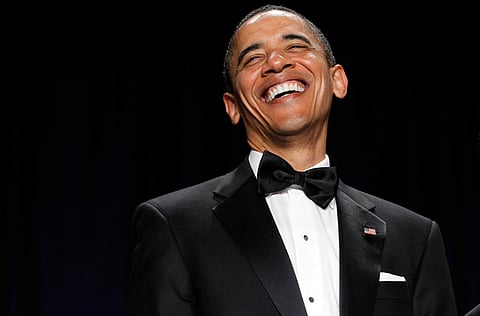Obama's balancing act
US president has to thread a needle between his centrist position and his old liberal base

President Barack Obama faces an uphill struggle in his campaign for re-election next year. His job approval rating is stuck just below 50 per cent. The unemployment rate appears likely to remain above 8 per cent until election day. And, though it's too soon to mean much, early polling puts the nominal Republican front-runner, former Massachusetts Governor Mitt Romney, within striking distance.
Even Obama's staff acknowledges the obstacles. "It's going to be a very close, competitive election ... a street fight for the presidency," White House aide David Plouffe, the strategist who managed Obama's 2008 victory, told reporters cheerfully on Wednesday. So why did he look so cheerful? In part because Team Obama seems to genuinely believe that the president will get his second term. Plouffe and other Obama backers offer at least four reasons why.
First, Plouffe suggested, Obama has an opportunity to improve his standing among independent voters — many of whom deserted the Democrats in the 2010 midterm election — by working with Republicans toward bipartisan deficit-reduction measures. Second, Obama has managed to move toward the centre without losing significant support among core Democratic voters.
The president's job approval rating among Democrats, Plouffe said, is in the 80 per cent to 90 per cent range in many states. (Nationally, it's about 77 per cent, still respectable.) Third, demographics help the Democrats. One of the keys to Obama's victory in 2008, Plouffe noted, was high turnout among young, black and Latino voters, all groups that heavily supported the Democrat. Next year's electorate should include even more minority voters than last time. Fourth, Obama is a seasoned campaigner who ran a long, tough election campaign in 2008, and he still has the team that helped him to victory in place.
Does that reasoning stand up to scrutiny? Let's take the assertions one at a time. Obama certainly has veered back toward the centre after two years of enacting liberal-friendly measures like his $787-billion (Dh2.89 trillion) economic stimulus package and his health care law. In the current negotiations over raising the $14-trillion debt limit, he has taken pains to move at least halfway toward Republicans' demands.
Enthusiasm gap
Obama aides appear to believe the president has plenty of leeway to make a deal with Republicans on debt reduction because, to put it bluntly, liberal Democrats don't have anywhere else to go. Stanley Greenberg, a Democratic strategist who has been critical of White House political strategy, says that so far at least, Plouffe's optimism on this count is justified.
The ‘enthusiasm gap' that drove more Republicans than Democrats to the polls in last year's congressional election, Greenberg said, is no more. At this point, he asserted, "Democrats are more enthusiastic than Republicans." Still, Democrats are depending on Republicans to help — by waging a polarised campaign that sends liberal voters back to Obama.
Plouffe's third reason for optimism — that Obama's strong base of support among young, black and Latino voters will stand him in good stead — has something to it.
"We believe that we can improve over what we did in 2008 in turnout in some of those base Obama groups." That will be difficult. But the underlying trend — the growing share of the electorate that's composed of minority voters — certainly favours the Democrats. Latinos, particularly, make up a bigger share of the electorate in every cycle. But Obama will have to show them that they have a reason to support him. Immigration reform had slipped far down on his priority list even before the Democrats lost their majority in the House of Representatives; now, with the GOP in control, meaningful reform stands little chance of getting through Congress.
Team Obama is well organised, it's raising a war chest that may reach a billion dollars, and it hopes to rebuild the vast volunteer network that helped the president win 28 states.
Plouffe was indisputably right about one thing: Winning re-election won't be easy. Obama has to thread a needle between his new centrist position and his old liberal base; on that front, this month's battle over the debt ceiling offers both opportunity and peril. The 2012 presidential election could be won or lost in the next three weeks.
— Los Angeles Times



